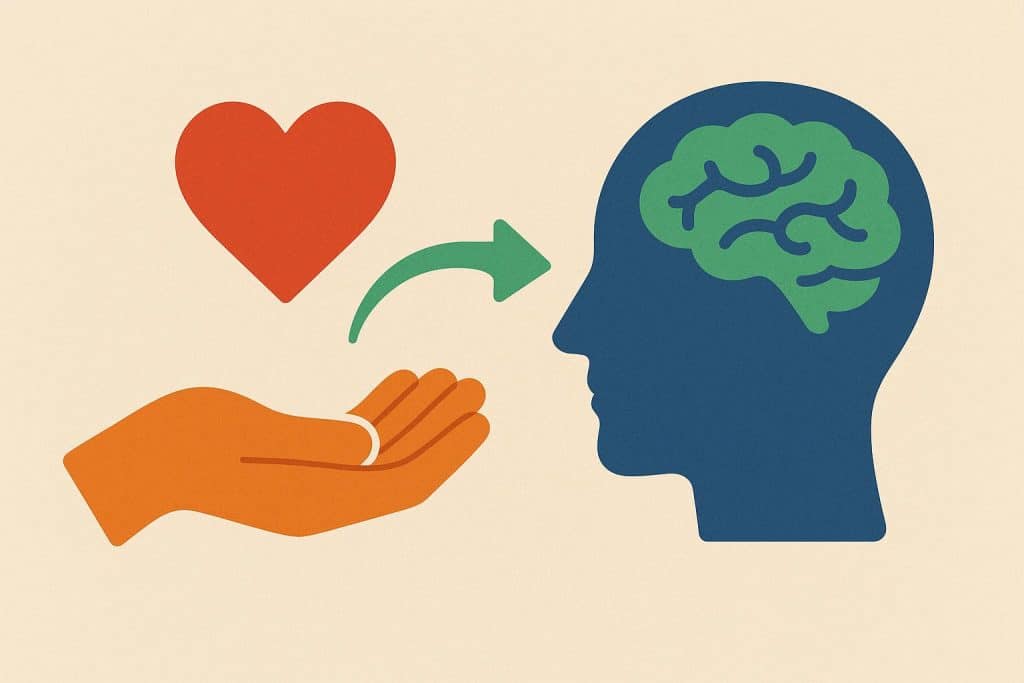Stress and anxiety have become part of daily life for many people, with everyone now searching for ways to feel more balanced and fulfilled. While practices like meditation, exercise, and therapy are common tools to improve mental health, another powerful and many a times overlooked method is generosity. Acts of giving, be it through time, resource, or emotional support, can have a massive impact on mental well-being. Both science and spirituality align to the same conclusion, that when we give to others, we also receive for ourselves.
Why Giving Feels Good
It goes without say that generosity triggers some sort of emotional response. Scientists within the neurological department find that when we engage in selfless acts, our brains release a feel-good chemical high such as dopamine and endorphins. This reaction creates a natural sense of happiness and satisfaction. Similar to how exercise boosts mood through endorphin release, giving activates the brain’s reward system, reinforcing positive behavior and encouraging us to repeat it.
This isn’t just a one-off moment of joy. Regular acts of generosity have been linked to lasting improvements in mental health. Research has found that people who consistently give their time or money to help others report higher levels of satisfaction in life and lower levels of depression. What this tells us is that generosity creates a loop, the more we give, the better we feel, which inspires us to give more.
The Role of Empathy and Connection
We humans are social beings, and our mental health thrives on meaningful relationships. Being generous fosters being empathetic and trusting to others. When we help someone, we acknowledge their needs. Helping that person can then deepen a friendship, repair strained family ties, and even build bridges between strangers.
From a psychological point of view, giving helps shift focus away from our own worries. Many mental health struggles, such as anxiety and depression come from repetitive, negative thoughts about us or our situations. By redirecting attention toward others, we interrupt this cycle. Instead of feeling trapped in our own problems, we gain perspective outside of the box and a fixed sense of purpose.
Generosity as a Coping Mechanism
Life will always bring forward challenges, this could be from financial difficulty to personal loss. In difficult times however, practicing generosity can serve as a powerful coping mechanism. Helping others can remind us that even in moments of struggle, we still have something valuable to offer.
This doesn’t in any way mean that we should ignore our own needs. Generosity comes with balance; it’s about giving but without exhausting ourselves. Setting boundaries from the get-go is essential to prevent burnout or bitterness. When practiced mindfully, generosity becomes a source of spirit rather than a drain on emotional energy.
Spiritual Dimensions of Giving
Across many cultures and religions, generosity is an important aspect of one’s belief. Various traditions teach people that giving is not only beneficial to the one who receives, but also meaningful to the giver. It practices humility and most importantly gratitude.
For example, in Islam, charitable acts are woven through practices like Zakat 2026, which encourages individuals to share a portion of their wealth with those in need annually. While the spiritual significance is powerful, the act of giving also fits with modern findings: organized giving practices create opportunities to experience joy, connection, and purpose.
Generosity in the Modern World
In today’s modern era with exposure to online activity, opportunities in giving are even more accessible. Digital platforms give people the opportunity to donate to global causes and volunteer virtually. The form of generosity can also be derived by sending a kind message to a friend or just checking in on someone. While the format of generosity may evolve, its impact on mental health remains consistent.
Though there’s positives to the evolving digital world, there’s also the aspect of barriers being put in place where people can feel overwhelmed by the fast pace of modern life, leaving little room for meaningful giving. The key is to start small. Even simple acts, like listening attentively to a friend or offering a compliment can spark the same psychological benefits as larger gestures. Over time, these small acts build into a habit of generosity that benefits both the giver and receiver.
Creating a Culture of Giving
Imagine a community where generosity is not a small act but a shared way of life. Workplaces that encourage volunteering that prioritize acts of kindness, and schools that teach empathy can all contribute to a culture that supports mental health and well-being. When generosity becomes part of daily routine, it not only benefits an individual’s life, but also a society as a whole.
As research continues to connect the act of giving and mental health, there is growing recognition that generosity is not just a moral practice but also a tool to positive well-being. By fostering habits of kindness and acts of giving, we can address some of the underlying causes of loneliness, stress, and despair in modern society.
Final Thoughts
Generosity is far more than just giving; it is a powerful act to healing and growth. Whether through daily small gestures or significant acts of charity, giving allows us to surpass our own struggles and connect with something larger than ourselves. In doing so, we not only improve the lives of others but also bring a shift to our own mental health.
In a world that often feels divided and uncertain, generosity offers a path towards hope and spirit. By embracing the act of giving, we take a step toward a happier and healthier future for both ourselves and the communities we touch.
